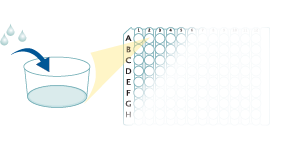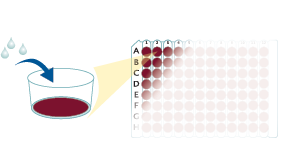 全部商品分类
全部商品分类



 下载产品说明书
下载产品说明书 下载SDS
下载SDS 用小程序,查商品更便捷
用小程序,查商品更便捷


 收藏
收藏
 对比
对比 咨询
咨询Product Summary
Recovery
The recovery of IL-7 spiked to three different levels throughout the range of the assay was evaluated.
| Sample Type | Average % Recovery | Range % |
|---|---|---|
| Cell Culture Media (n=5) | 103 | 89-113 |
| Citrate Plasma (n=5) | 100 | 92-110 |
| EDTA Plasma (n=5) | 112 | 83-132 |
| Serum (n=5) | 100 | 91-113 |
Linearity
Scientific Data
Assay Procedure
Refer to the product- Prepare all reagents, standard dilutions, and samples as directed in the product insert.
- Remove excess microplate strips from the plate frame, return them to the foil pouch containing the desiccant pack, and reseal.
- Add 50 µL of Assay Diluent to each well.
- Add 200 µL of Standard, Control, or sample to each well. Cover with a plate sealer, and incubate at room temperature for 14-20 hours.
- Aspirate each well and wash, repeating the process 5 times for a total of 6 washes.
- Add 200 µL of Conjugate to each well. Cover with a new plate sealer, and incubate at room temperature for 2 hours.
- Aspirate and wash 6 times.
- Add 50 µL Substrate Solution to each well. Cover with a new plate sealer, and incubate at room temperature for 45 minutes. Do not wash the plate.
- Add 50 µL Amplifier Solution to each well. Cover with a new plate sealer, and incubate at room temperature for 45 minutes.
- Add 50 µL of Stop Solution to each well. Read at 490 nm within 30 minutes. Set wavelength correction to 650 nm or 690 nm.






Human IL-7 Quantikine HS ELISA Kit Summary

Background: IL-7
IL-7 (Interleukin-7) is a cytokine that plays important roles in lymphocyte differentiation, proliferation, and survival. IL-7 is produced by stromal epithelial cells of the thymus, bone marrow, and intestines. It signals through a receptor complex composed of IL-7 R alpha/CD127 and the Common gamma Chain. gamma c is also a subunit of the receptors for IL-2, -4, -9, -15, and -21. IL-7 contributes to the maintenance of all naïve and memory T cells. It is required for optimal T cell-dendritic cell interaction. In mouse, IL-7 activation of IL-7 R alpha is critical for both T cell and B cell lineage development, while in humans, it is required for T cell but not for B cell development.








